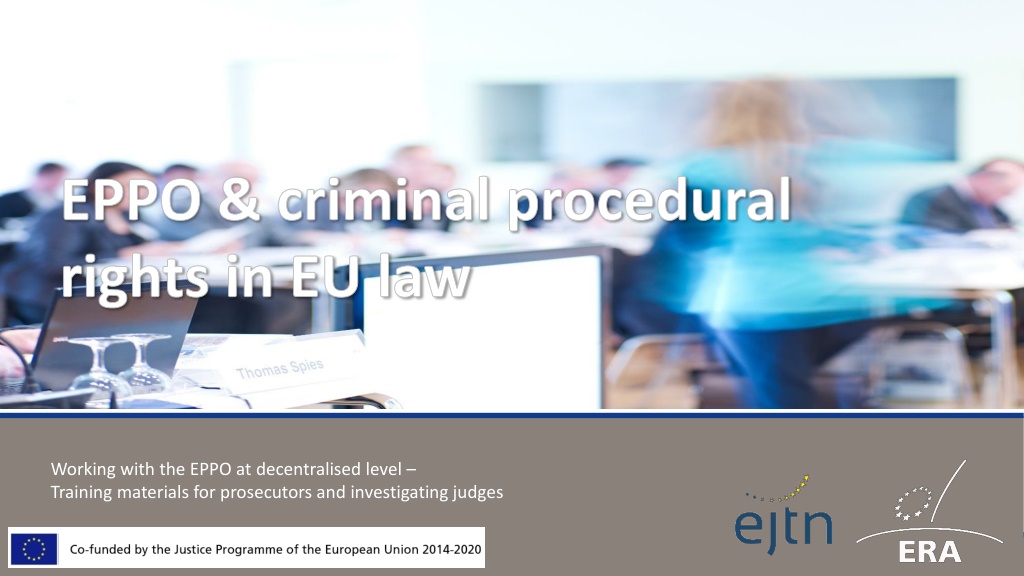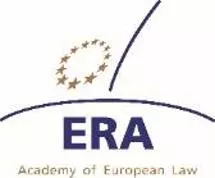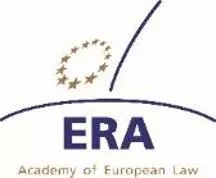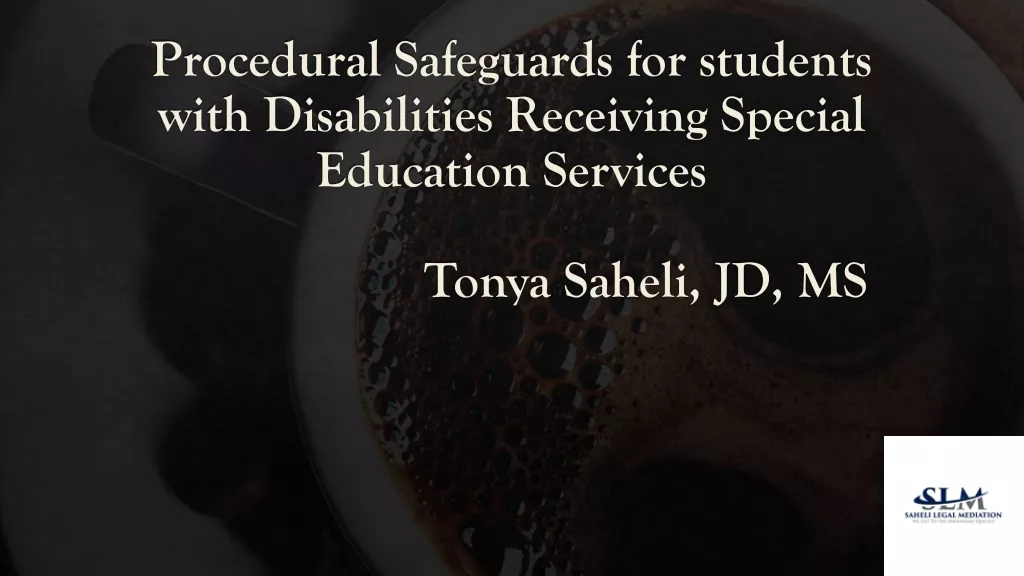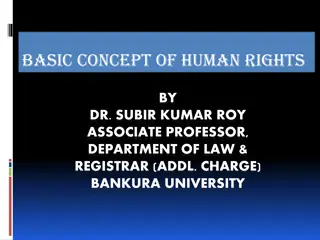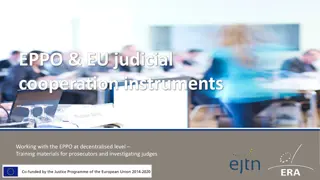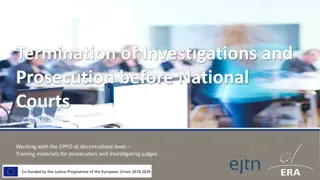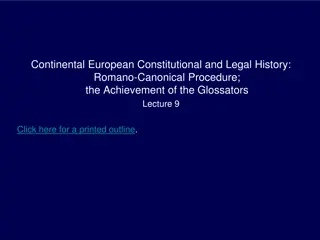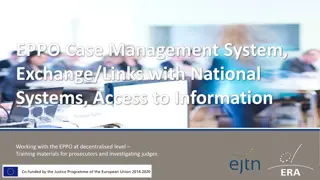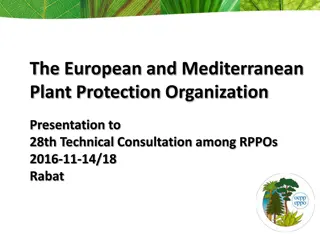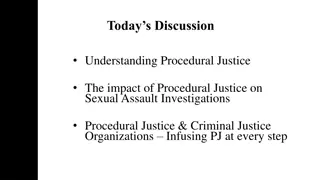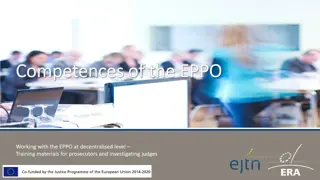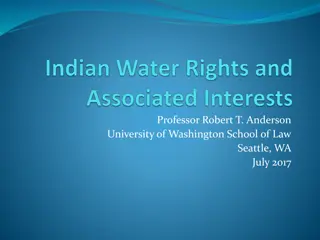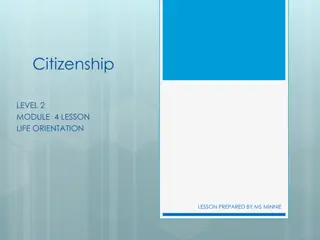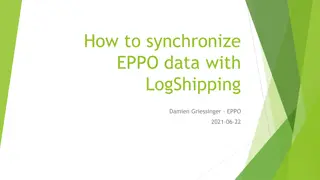Overview of EPPO and Procedural Rights in EU Law
This material focuses on the European Public Prosecutor's Office (EPPO) and its adherence to procedural rights within the framework of EU law. It covers the provisions of the EPPO Regulation related to procedural rights, including principles of rule of law, impartial investigations, and judicial review by national courts. The document emphasizes the importance of safeguarding the rights of suspects and accused persons, as well as the efficiency and integrity of investigations conducted by the EPPO.
Download Presentation

Please find below an Image/Link to download the presentation.
The content on the website is provided AS IS for your information and personal use only. It may not be sold, licensed, or shared on other websites without obtaining consent from the author.If you encounter any issues during the download, it is possible that the publisher has removed the file from their server.
You are allowed to download the files provided on this website for personal or commercial use, subject to the condition that they are used lawfully. All files are the property of their respective owners.
The content on the website is provided AS IS for your information and personal use only. It may not be sold, licensed, or shared on other websites without obtaining consent from the author.
E N D
Presentation Transcript
EPPO & criminal procedural rights in EU law Working with the EPPO at decentralised level Training materials for prosecutors and investigating judges 1
Overview I. EPPO and Procedural Rights Procedural Rights & EPPO Regulation EPPO & EU Charter of Fundamental Rights EPPO & EU Procedural Rights Directives EPPO & National Law 2
Procedural rights & EPPO Regulation EPPO Regulation contains a number of provisions relating to procedural rights. E.g.: Art. 5 (2): The EPPO shall be bound by the principles of rule of law and proportionality in all its activities. Art. 5 (4): The EPPO shall conduct its investigations in an impartial manner and shall seek all relevant evidence whether inculpatory or exculpatory. Art. 5 (5): The EPPO shall open and conduct investigations without undue delay. Art. 30 (5): The European Delegated Prosecutors may only order the measures referred to in paragraphs 1 and 4 where there are reasonable grounds to believe that the specific measure in question might provide information or evidence useful to the investigation, and where there is no less intrusive measure available which could achieve the same objective. 3
Procedural rights & EPPO Regulation Provisions relating to procedural rights in EPPO Regulation continued: Rec. (67) In order to best safeguard the rights of the defendant, in principle a suspect or accused person should only face one investigation or prosecution by the EPPO. Where an offence has been committed by several persons, the EPPO should in principle initiate only one case and conduct investigations in respect of all suspect or accused persons jointly. Rec. (68) Where several European Delegated Prosecutors have opened investigations in respect of the same criminal offence, the Permanent Chamber should where appropriate merge such investigations. The Permanent Chamber may decide not to merge such proceedings or decide to subsequently split such proceedings if this is in the interest of the efficiency of investigations, for example if proceedings against one suspect or accused person could be terminated at an earlier stage, whereas proceedings against other suspect or accused persons would still have to be continued, or if splitting the case could shorten the period of pre-trial detention of one of the suspects. Where different Permanent Chambers are in charge of the cases to be merged, the internal rules of procedure of the EPPO should determine the appropriate competence and procedure. Where the Permanent Chamber decides to split a case, its competence for the resulting cases should be maintained. 4
Procedural rights & EPPO Regulation Provisions relating to procedural rights in EPPO Regulation continued: Art. 42(1): Judicial review by the competent national courts Art. 42(2)-(4): Judicial review by Court of Justice Rec. (87) It is appropriate to consider that procedural acts of the EPPO that are intended to produce legal effects vis- -vis third parties should be subject to review by the competent national courts in accordance with the requirements and procedures laid down by national law. This should ensure that the procedural acts of the EPPO that are adopted before the indictment and intended to produce legal effects vis- -vis third parties (a category which includes the suspect, the victim, and other interested persons whose rights may be adversely affected by such acts) are subject to judicial review by national courts. Procedural acts that relate to the choice of the Member State whose courts will be competent to hear the prosecution, which is to be determined on the basis of the criteria laid down in this Regulation, are intended to produce legal effects vis- -vis third parties and should therefore be subject to judicial review by national courts, at the latest at the trial stage. 5
Procedural rights & EPPO Regulation but it does not set a comprehensive list of safeguards applicable to EPPO proceedings . Additional/co-existing layers of protection to be found in EU and National law: EU CHARTER OF FUNDAMENTAL RIGHTS EU PROCEDURAL RIGHTS DIRECTIVES NATIONAL LAW 6
EPPO & EU CHARTER Art. 5 (1) The EPPO shall ensure that its activities respect the rights enshrined in the Charter Art. 41. Scope of the rights of the suspects and accused persons 1. The activities of the EPPO shall be carried out in full compliance with the rights of suspects and accused persons enshrined in the Charter, including the right to a fair trial and the rights of defence. Recital (83) This Regulation requires the EPPO to respect, in particular, the right to a fair trial, the rights of the defence and the presumption of innocence, as enshrined in Articles 47 and 48 of the Charter. Article 50 of the Charter, which protects the right not to be tried or punished twice in criminal proceedings for the same offence (ne bis in idem), ensures that there will be no double jeopardy as a result of the prosecutions brought by the EPPO. The activities of the EPPO should thus be exercised in full compliance with those rights and this Regulation should be applied and interpreted accordingly. 7
EU CHARTER & CRIMINAL PROCEEDINGS Most relevant provisions . Article 47 Right to an effective remedy and to a fair trial fair and public hearing within a reasonable time by an independent and impartial tribunal previously established by law. Everyone shall have the possibility of being advised, defended and represented. Legal aid shall be made available to those who lack sufficient resources in so far as such aid is necessary to ensure effective access to justice. Article 48 Presumption of innocence and right of defence Article 50 Right not to be tried or punished twice in criminal proceedings for the same criminal offence 8
EPPO & EU PROCEDURAL RIGHTS DIRECTIVES EPPO REGULATION Article 41. Scope of the rights of the suspects and accused persons 2. Any suspected or accused person in the criminal proceedings of the EPPO shall, at a minimum, have the procedural rights provided for in Union law, including directives concerning the rights of suspects and accused persons in criminal procedures, as implemented by national law. What are these Procedural Rights Directives? Legal Basis ART. 82 TFEU The European Parliament and the Council by means of directives may establish minimum rules concerning the rights of individuals in criminal procedure Need to balance the enforcement side (MR) and the fundamental rights side (procedural safeguards) to reinforce mutual trust . Common minimum standards to safeguard the rights of defence and the fairness of criminal proceedings 9
Background EU procedural rights WE HAVE COME A LONG WAY 28 April 2004 European Commission tabled a proposal for a Framework Decision on certain procedural rights in criminal proceedings throughout the European Union NOT ADOPTED Roadmap of Procedural Safeguards introduced in the Stockholm Programme (2009) under Swedish Pesidency, providing a step-by-step programme (Measures A to F) 6 Directives adopted from 2010 to 2016 setting out common minimum standards for criminal proceedings in the EU which procedural rights do they recognize? 10
6 Directives 1. Directive 2010/64/EU on Interpretation and translation = transposition deadline 27/10/2013 2. Directive 2012/13/EU on Information = transposition deadline 02/06/2014 3. Directive 2013/48/EU on Access to lawyer; information of and communication with third persons and consular authorities = transposition deadline 27/11/2016 4. Directive (EU) 2016/343 on Presumption of innocence = transposition deadline 1/4/2018 (5. Directive (EU) 2016/800 Children) 6. Directive (EU) 2016/1919 on Legal aid = transposition deadline 25/5/2019 12
Procedural Rights Directives relevant for EPPO Article 41. Scope of the rights of the suspects and accused persons 2. Any suspected or accused person in the criminal proceedings of the EPPO shall, at a minimum, have the procedural rights provided for in Union law, including directives concerning the rights of suspects and accused persons in criminal procedures, as implemented by national law, such as: (a) the right to interpretation and translation, as provided for in Directive 2010/64/EU; (b) the right to information and access to the case materials, as provided for in Directive 2012/13/EU; (c) the right of access to a lawyer and the right to communicate with and have third persons informed in the event of detention, as provided for in Directive 2013/48/EU; (d) the right to remain silent and the right to be presumed innocent as provided for in Directive (EU) 2016/343; (e) the right to legal aid as provided for in Directive (EU) 2016/1919. 13
1. Directive on Interpretation and translation in criminal proceedings and proceedings for the execution of a EAW Art. 2 Right to interpretation for suspected/accused who do not speak or understand the language of the criminal proceedings: Without delay/during criminal proceedings before investigative-judicial authorities, including police and all court hearings/including for communication with their lawyer/sufficient quality Art. 3 Written translation of essential documents for suspected/accused who do not understand the language of the criminal proceedings Within a reasonable period of time/ all documents essential to ensure right of defence and safeguard the fairness of proceedings (exceptions and waivers) Right to challenge negative decisions and complain on insufficient quality 14
2. Directive on Information Art. 3 Information about rights: promptly informed orally or in writing of procedural rights Art. 4 Letter of Rights on arrest (includes information re. deprivation of liberty) Art. 6 Right to information about the accusation/reasons for arrest Art. 7 Right of access to the materials of the case Persons who are arrested or detained: access to documents essential to challenge the lawfulness of their arrest All suspected or accused persons: right to access all material evidence in the possession of competent authority in due time. Access may be refused in cases of: serious threat to life/fundamental rights/safeguard of important public interest. Decisions to refuse: judicial authority or judicial review 15
3. Directive on Access to lawyer Art. 3 Right of access to a lawyer without undue delay and in any case before questioning by police or judicial authority, upon the carrying out of an investigative act, after deprivation of liberty, or when summoned by court before the hearing = Right to meet in private/right for the lawyer to be present and participate effectively during questioning. Arts. 5-7 Right to have a 3rd person informed of the deprivation of liberty and communicate with 3rd persons/consular authorities Art. 10 European Arrest Warrant Proceedings: right to access a lawyer in executing State upon arrest and right to appoint a lawyer in the issuing Member State (to assist the lawyer in the executing MS) 16
4. Directive on Presumption of innocence Arts. 3-4-5 Presumption of innocence: includes obligation not to refer to or present suspects/accused persons as being guilty Art. 6 Burden of proof on the prosecution and in dubio pro reo principle Art. 7 Right to remain silent and right not to incriminate oneself Arts. 8-9 Right to be present at the trial, trial in absence and right to a new trial Art. 10 Effective remedies and assessment of evidence that respects rights of defence and fairness of proceedings in case of breach 17
6. Directive on Legal aid for suspects/accused persons in criminal proceedings and requested persons (EAW) Legal aid = funding by a MS of the assistance of a lawyer, enabling the exercise of the right of access to a lawyer Article 4 Legal aid in criminal proceedings for those who lack sufficient resources (means test/merits test/ or both are allowed) Article 5 Legal aid in EAW proceedings Right to legal aid in the Executing state when arrested for the execution of a EAW + Right to legal aid in the issuing MS regarding the assisting lawyer in so far as necessary to ensure effective access to justice 18
EPPO & NATIONAL LAW Article 41. Scope of the rights of the suspects and accused persons 3. Without prejudice to the rights referred to in this Chapter, suspects and accused persons as well as other persons involved in the proceedings of the EPPO shall have all the procedural rights available to them under the applicable national law, including the possibility to present evidence, to request the appointment of experts or expert examination and hearing of witnesses, and to request the EPPO to obtain such measures on behalf of the defence. See also Art. 45(2): access to the case file by suspects and accused persons in accordance with the national law of the handling Prosecutor s Member State. 19
Conclusion: how will it work in practice? No homogeneous minimum procedural safeguards and standards for EPPO proceedings Detail on number and content of procedural rights both in the investigation and the trial phase are missing Complexity of dual referral to EU Procedural Directives and National laws Possible problems? - effectiveness of rights dependant on national transposition of Directives that can differ across the EU -articulation of 2 national laws and different levels of protection for defendants in cases with cross-border elements 20
QUIZ - TEST YOUR KNOWLEDGE A) The EPPO Regulation sets out a specific catalogue of procedural rights for EPPO proceedings B) As regards procedural safeguards, the EPPO Regulation contains a double referral to national and EU law C) The EPPO acts impartially and is bound by the principle of rule of law and proportionality in all its activities, which sufficiently ensures procedural rights of the defendant will always be respected Correct answer: B) 21
Thank you for your attention WWW.EUROPEAN.LAW
